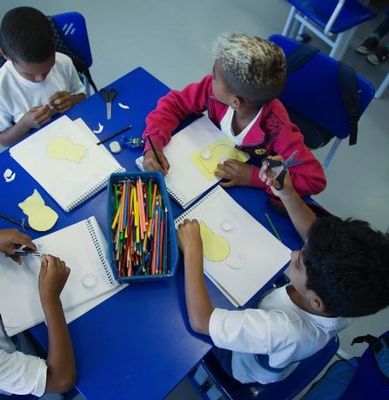São Paulo – Making sure that low-income children stay in school is the mission of Educate a Child, a Qatari government program active in Brazil since 2013 in partnership with non-governmental organizations (NGOs) in Rio de Janeiro.
Educate a Child is coordinated by Education above All, an initiative established in 2012 by sheikha Mozah bint Nasser. It works to enable access to school for poor children through financing to NGOs and organizations in several countries.
In Rio de Janeiro, Educate a Child has partnered with Associação Cidade Escola Aprendiz, a project whose job is to ensure that children in Rio’s favelas graduate from primary school. From April 2013 to June 2016, the partnership brought over 16,000 kids aged 6 to 14 to school. The goal is to have another 5,000 by the end of this year.
“[Associação Cidade Escola] Aprendiz has already enrolled more than 16,000 children into primary education and aims to reach a total of 21,000 out-of-school children by the end of the year. To achieve its goal, the project is conducting social-territorial mapping of children currently out of school to ascertain why these children are not attending or may have dropped out,” Education Above All CEO Fahad Al-Sulaiti told ANBA by email.
“A government committee is also looking into the integration of policies to support reaching children who are not in school, and community task forces are created to design strategies that encourage children to stay in school,” he explained. The Qatari program also had a one-year partnership in 2013 with NGO Todos pela Educação (All for Education), covering Rio de Janeiro and São Paulo.
Al-Sulaiti also said student communication groups are being created to transform schools into inclusive and welcoming environments. “In order to ensure that the project reaches as many out-of-school children as possible, it is implementing active search strategies to identify where out-of-school children are located and what factors are keeping them out of school. Additionally, Aprendiz is conducting training for those involved in the project on how to identify and reach these children and their families,” he pointed out.
In order to put that many kids through school, Educate a Child finances half the costs in each of the countries it is active in. The other half is met by local partners through co-funding organizations. Since 2013, the Qatari organization has committed over USD 112 million to projects in Brazil.
“Educate a Child and Aprendiz are working together to expand the Ministry of Education’s Schools of Tomorrow program, which targets children living in Rio de Janeiro’s favelas, and seeks to ensure the provision of quality primary education. EAC provides both technical and financial support to Aprendiz, which is working on the ground to scale up the Schools of Tomorrow initiative to reach more out-of-school children,” Al-Sulaiti said.
Schools of Tomorrow is a Rio de Janeiro City Hall initiative created in 2009 to improve education in the city and make full-time education available across the municipality by 2020.
Global work
At this time, Educate a Child is active in 41 countries around the world, including Latin AMerica, the Caribbean, Africa, the Middle East and Asia. “The number of projects in a country can vary significantly as can the number of OOSC reached. Some of the larger projects are in Africa, specifically Nigeria, the Democratic Republic of Congo and Sudan,” Al-Sulaiti explained.
In Brazil, he stressed the partnership of NGO Aprendiz with the municipal government of Rio de Janeiro as one of the factors that have allowed the program to be successful.
“The programme in Brazil benefits particularly from the close working relationship with the departments of Education, Health and Social Development. Aprendiz uses data for decision making, contributing to broader policy discussions on OOSC. Through governmental collaboration, community engagement and targeted outreach, city authorities are aiming to use the project experience and results to reach more vulnerable children, which will contribute to the sustainability of the effort,” the Educate a Child CEO said.
*Translated by Gabriel Pomerancblum



